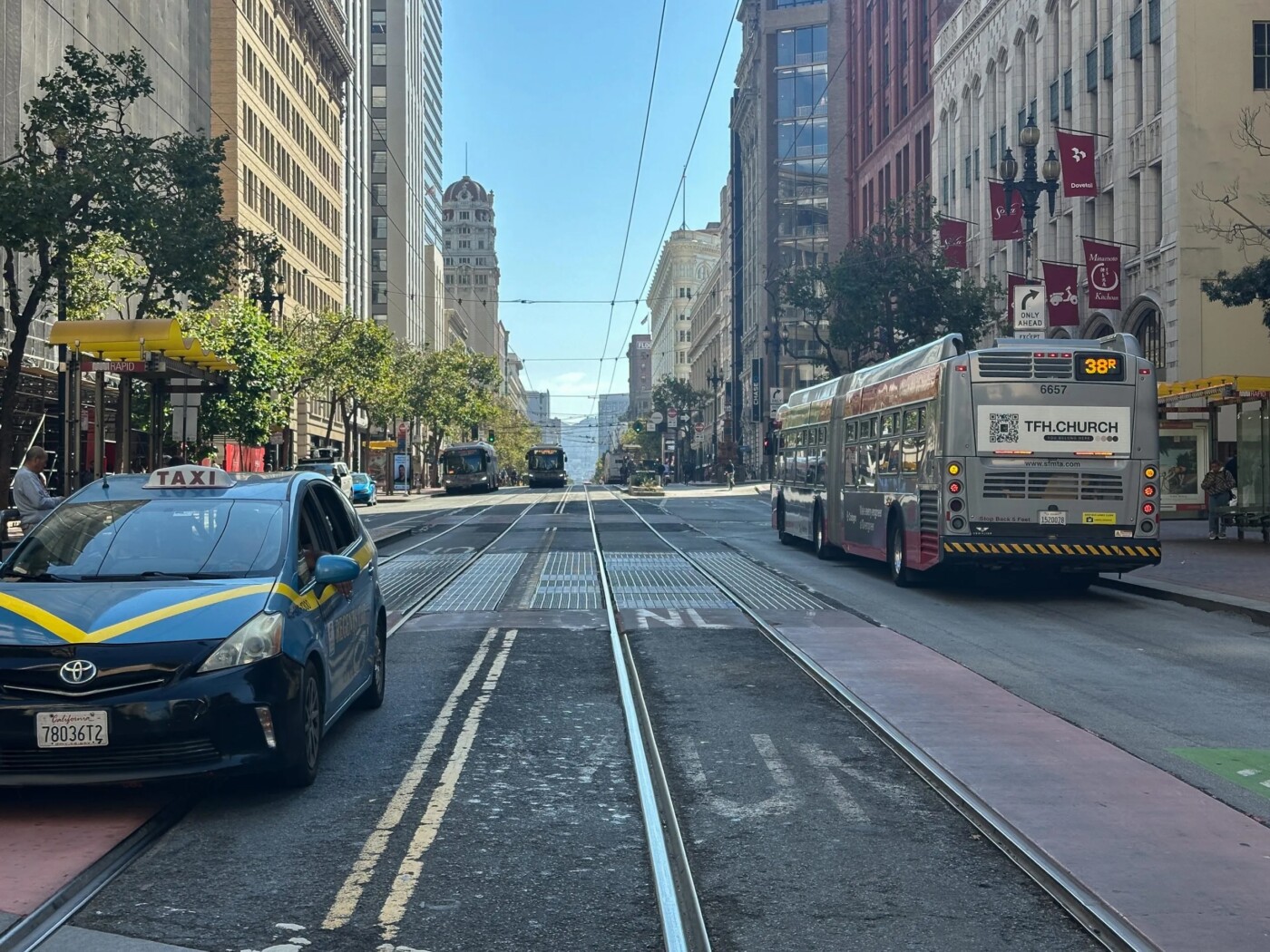AT THE INTERSECTION of San Francisco’s Market and Montgomery streets Tuesday, transit advocates congregated to voice their disdain about the city’s decision to open up the roadway to ride hailing services.
Several transit advocacy groups rallied together in the late afternoon and called upon San Francisco Mayor Daniel Lurie to reconsider his administration’s decision to reopen the city’s main thoroughfare to commercial traffic after banning most non-public transit vehicles five years ago during the COVID-19 pandemic. While the bells of streetcars and honks of Muni buses can still be heard traveling down the road, almost all other vehicles have been limited to certain crossing points going across Market Street.
The spark for a protest started when the San Francisco Municipal Transportation Agency’s director of transportation, Julie Kirschbaum, posted a public notice to SFMTA’s website last Wednesday which was addressed to “Taxi Industry Members,” announcing the city would be permitting Waymo and a limited number of commercial vehicles from Lyft and Uber to use certain portions of Market Street–areas that have been car-free for a half a decade.
“Taxis are core to San Francisco’s safety net of services and serve residents and visitors in every neighborhood, including older adults and people with disabilities,” said Kirschbaum in the statement. “You will continue to play an important role in human-delivered transportation and your continued commitment to providing outstanding customer service will continue to distinguish taxi services.”
Kirschbaum said the decision was in line with Lurie’s downtown revitalization efforts. During his campaign for mayor, one of his largest policy points was to combat the growing number of abandoned offices and retail spaces in downtown San Francisco.
Local advocacy groups point to the reduction in collisions and faster public transit times as proof the car-free road has been successful.

Streets For All San Francisco, a group that calls for safer and slower streets across the city, joined the coalition of protesters. Executive Director Robin Pam said the reduction in private vehicles traveling down Market Street has been a net positive for public transit riders as congestion has largely been reduced.
“Market Street was actually never designed for cars,” said Pam. “The solution to traffic is not putting more cars on the street, it’s not making it easier to drive everywhere or creating more lanes in our downtown street grid. The solution to traffic is getting more people to take the bus, to get out of their cars, whether that’s carpooling, taking the bus, riding their bike, walking where they need to go, and making all of those other ways of getting around much more accessible and safer for everybody, and making them faster.”
Streets Forward wants the thoroughfare to remain closed to commercial vehicles because they believe the documented improvements made by public transit, bicyclists, and pedestrians show what has worked for the city.
The solution to traffic is getting more people to take the bus, to get out of their cars, whether that’s carpooling, taking the bus, riding their bike, walking where they need to go, and making all of those other ways of getting around much more accessible and safer for everybody, and making them faster.
Robin Pam, streets for all san francisco Executive Director
“Streets Forward is ready to work collaboratively with Mayor Lurie to revitalize Market Street and downtown using data-driven best practices that will deliver positive and measurable results for Market Street, downtown, and San Francisco,” said the organization’s executive director, Luke Bornheimer. “The people of San Francisco deserve visionary leadership that moves us forward, not tried-and-failed policies that will move us backward.”
Uber spokesperson Ramona Prieto said the company looks forward to serving riders across the downtown area to help revitalize the area.


“Reopening Market Street to commercial vehicles like Uber Black is a meaningful step toward bringing new energy back to downtown,” wrote Prieto in an email. “We’re proud to support the city’s efforts to revitalize the core and we look forward to continuing to work with city leaders, riders, and drivers to ensure long-term, equitable access to Market Street.”
The SFMTA said the expansion of street access to these services will add to transportation options for travelers while protecting Muni services, street safety, and curbside efficiency. According to the agency, the rollout will be gradual and closely monitored as they analyze the pros and cons as well as public sentiment.
The post SF’s Market Street to open to ride hailing services, much to the chagrin of some locals appeared first on Local News Matters.
